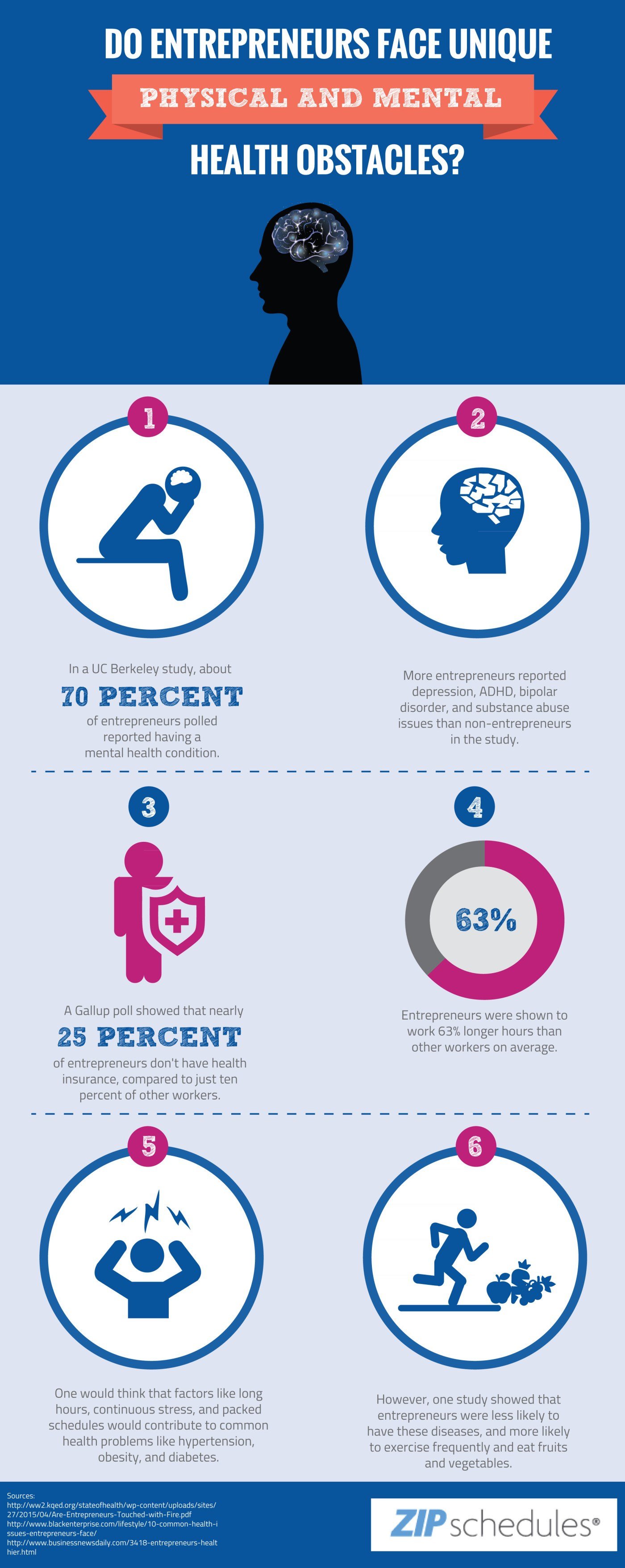We think of being driven, innovative, gutsy, and self-sustaining as typical entrepreneurial traits. We know that it takes a special level of commitment and continuous learning to get a business off the ground and keep it there. So with all of this effort pointed in one direction, it stands to reason that entrepreneurs might have a tendency to neglect their health (along with a variety of other things in life) to pursue the growth and success of their business. However, one poll by Gallup seemed to suggest just the opposite pattern – entrepreneurs tend to be even healthier than other workers – at least in the physical sense. A study by Louisiana State University revealed an interesting pattern in a town that was heavily populated by small businesses – Summit County, Colorado. They found that as small businesses continued cropping up around town, the health of the community as a whole improved. Obesity, diabetes, and mortality rates all declined steadily, ranking at less than half the national average.
While they may have a decent hold over their physical health, multiple studies have suggested that mental health problems are more common for entrepreneurs, and may even run in their families. In particular, self-reported rates of depression, ADHD, and bipolar disorder were significantly higher for entrepreneurs, while anxiety was just slightly higher. Businessman, investor, and successful tv personality, Robert Herjavec admitted to People magazine that he felt suicidal after his divorce, showing how even the richest and most famous business owners were subject to severe mental health issues. When considering the fact that entrepreneurs tend to have more freedom and flexibility than the average worker, you can see how they might have more time for exercise and healthy meal planning. Success in business requires a take-charge attitude, which many entrepreneurs seamlessly apply to their workout and dietary habits as well. However, they also tend to have much greater levels of responsibility and have more difficult decisions to make throughout the work week. Thus, the taxing aspects of running a business seem to weigh on the mind more heavily than the body.
Bridging the Gap
What can be done to balance the current gap in mind-body well being? For one, entrepreneurs can lighten their load by simply asking for more help and support. Not only will this relieve stress, but it has also been shown to have a positive impact on the growth of a business. A study by Xero showed that “about one third of successful business owners reported asking mentors or family members for assistance. Meanwhile, among those whose businesses failed, just 14% reported asking for help.” Releasing some of the urge to handle everything and be in control can help entrepreneurs delegate tasks to other employees and develop trust. It will also free up some much-needed time to recoup from work activities. Entrepreneurs can also be aware of any obsessive compulsive tendencies like ruminating, overworking, and maintaining extremely high expectations. Ask any entrepreneur if they’ve ever dealt with perfectionism during the course of a project, and you’ll likely see a smile start to form. Such habits were reported as being more common in business owners, who are often self-motivated achievers by nature. Scheduling mandatory breaks at the same time each day can help prevent entrepreneurs from feeling powerless to these ingrained habits. Planning ahead properly and knowing what to expect is a huge stress reliever – keep a calendar or a to-do list to stay productive at work. If employees and managers know their objectives and their work schedule is clearly defined, they have a better chance of success. By directing some of that intense focus toward relaxation, expression, and self-care, entrepreneurs can break the cycle of mental stress and burnout. Featured photo credit: Ed Gregory/Stokpic via stokpic.com
